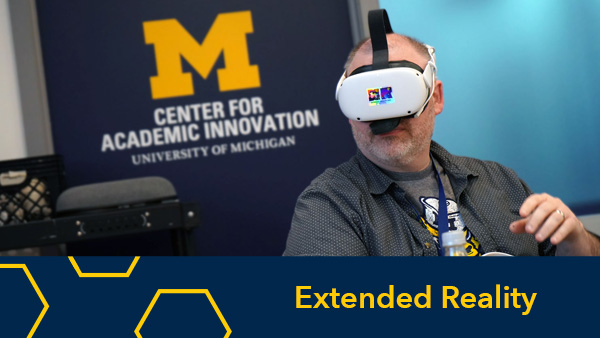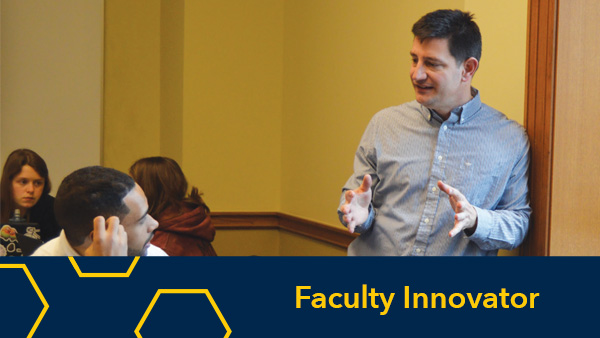Highlighting free learning opportunities for professional development, lifelong learning available free to University of Michigan students, faculty and staff
Sean Corp, Content Strategist
Effective communication is important no matter where you are at in your career. Whether you’re managing a matrixed organization or a new graduate just starting your professional path, you will be confronted with difficult conversations, conflicts and the need to communicate clearly to maximize the impact of a project and progress through your career.
U-M students, faculty and staff have free access to many learning opportunities through Michigan’s online learning opportunities and Michigan+, which provides enrollment in Coursera’s catalog of more than 3,700 Guided Projects, courses, Specializations and Professional Certificates from university and industry partners all over the world.
Here are some highlights available free to U-M students, faculty and staff, including courses taught by University of Michigan faculty and other Coursera partners such as University of Toronto, University of California, Irvine, Rice University and more.
U-M alumni are also able to enroll in courses taugh by U-M faculty on Coursera with their U-M credentials. Individuals who don’t have or do not remember their U-M uniqname can visit the identity verification page on the U-M Information and Technology Services (ITS) website. For related inquiries, contact U-M ITS.
These are just some of the courses available. To explore all the options, log into Coursera using the Michigan+ portal available on Michigan Online.
Leading People and Teams
Offered by: University of Michigan
Type: Specialization (approx. 20 weeks to complete)
In this specialization, you will learn essential leadership skills, including how to inspire and motivate individuals, manage talent, influence without authority, and lead teams.
Inspiring and Motivating Individuals
Offered by: University of Michigan
Type: Course (approx. 12 hours to complete)
In this course, you will learn how to create a shared vision for your team and effectively communicate it to your teammates. You will also learn how to set effective goals and expectations in a way that best enables your team to attain the shared vision.
Leading Diverse Teams & Organizations
Offered by: University of Michigan
Type: Series (approx. 22 hours to complete)
In this new course, you’ll gain evidence-based knowledge and practical tools to help you design and lead diverse, equitable, and inclusive (DEI) teams and organizations. You’ll better understand yourself and your personal identity in the workplace and gain new skills to identify privilege, implicit bias, and microaggressions in your organization and to take action as an active ally and change advocate.
Good with Word: Writing and Editing
Offered by: University of Michigan
Type: Specialization (4-course series)
Perhaps the most important thing students and professionals of all kinds can do to improve their effectiveness is embrace the following advice: become good with words. This series of courses targets the writing side of that recommendation. The skills it focuses on include everything from how to arrange a complex set of information in a reader-friendly way, to how to give and receive high-quality feedback, to how to consistently hit deadlines.
Communication Strategies for a Virtual Age
Offered by: University of Toronto
Type: Course (approx. 8 hours to complete)
The traditional rules for speaking and presenting, meeting coordination, influencing people, negotiating and selling ideas no longer apply. This course will act as an overview on several concepts each of which could be a course of their own and our goal is to give you tools that you can practice and perfect on your own.
Conflict Management
Offered by: University of California, Irvine
Type: Specialization (4-course series)
In this Specialization, you’ll learn to strengthen your personal and professional relationships by constructively addressing conflicts between individuals and within organizations. You’ll build skills specifically aimed at managing intercultural conflicts in today’s global society, and you’ll explore how competing interests and goals, power imbalances, and other factors influence the nature of conflict and management strategies.
Communication Skills for Engineers
Offered by: Rice University
Type: Specialization (3-course series)
Engineers who want to advance in their profession need to be effective communicators. They need to clearly communicate complex ideas and technical project plans. They also need to be strong persuaders. Engineers who are good communicators get recognized by their supervisors and by their clients.
Communication in the 21st Century Workplace
Offered by: University of California, Irvine
Type: Course (approx. six hours to complete)
In today’s fast-paced business environment, employees at all levels find themselves being asked to handle more tasks, meet more deadlines, take on more responsibilities, and adapt to more change. Added to these challenges is the constantly shifting diversity of the workplace, where coworkers cope with generational, gender, age and cultural differences. Communication, both verbal and nonverbal, is at the foundation of everything we do and say, and is especially important in the 21st century workplace.
Relationship Management
Offered by: Rice University
Type: Course (approx. 23 hours to complete)
To be a successful engineer, you must work and play well with others. This course focuses on developing the skills you will need to build and sustain professional relationships and networks. Learn to coach and mentor others, manage conflict and build power and influence in the workplace.


